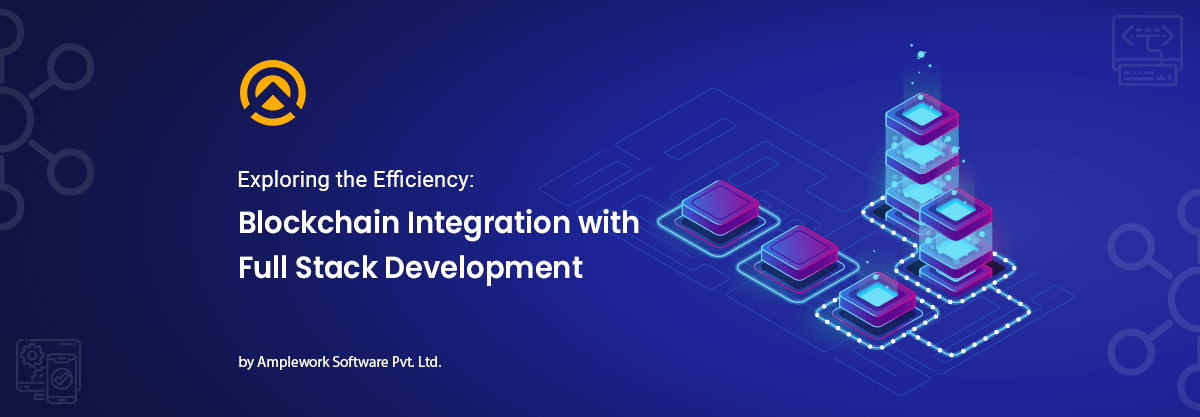Blockchain technology has been a most highlighted aspect in the past few years. With robust and secure features and functionalities, this technology has now been implemented in most of the full-stack development services. This technology has become an emerging trend in terms of mobile app development services. The well-organized world of blockchain technology has transformed the world of mobile app development solutions for businesses, making their transactions more secure and protected. That’s the reason why integrating blockchain into mainstream business mobile apps has now become a most compelling effort that most of businesses are highly preferring.
Delving into the intricacies of integrating blockchain in full-stack app development for redefining a variety of industrial security standards. This integration requires a mixture of technological fusion with strategic choices. Full stack development is already a beneficial mechanism for creating mobile apps as it comprises multiple development phases the front-end, back-end, and database development. Saving both the time and resources of businesses. Similarly when the blockchain is integrated with full-stack development company which involves the incorporation of decentralized, secure, and transparent mobile app development solutions.
With this blog, we will be exploring the seamless integration of blockchain in full-stack development, focusing on key aspects for the same like data security, decentralized mobile applications, and implementing smart contract mechanisms, etc. The technology is continuously evolving with a wider sort of improvisations and enhancements for transforming the software development process with ease. Here we will also be discussing how blockchain technology can be integrated into full-stack development, enhancing the performance and security standards of traditional systems.
Considering Some Statistical Exploration
 Source: Grand View Research
Source: Grand View Research
Understanding the concept of blockchain integration into full-stack development we have discovered some statistical considerations that are facilitated by a well-known research organization that is “Grand View Research”. According to their research data, the global Web 3.0 blockchain market size was USD 1.73 billion USD in the year 2022. In the year 2023, the level has crossed to approximately 2.5 billion. This research also clarifies the expected growth rate for the same will be approximately 47.1% from the year 2024 to 2030. This was recorded as a transformative growth in terms of both the blockchain in full-stack development services. This growth can be achieved just because of the rise in demand for data privacy and the need for decentralized apps.
Importance of Integrating Blockchain With Full-Stack Development
Integrating blockchain technology with full-stack development methodology is increasingly essential in the technological landscape. This integration approach brings a wide range of advantages shaping and revolutionizing the mobile app development solutions. Here’s how significant is integrating blockchain technology with full stack development services for enhancing the mobile app’s performance.
1. Enhanced Data Security
Blockchain technology is considered the most secure decentralized ledger. That’s the reason, why integrating it with a full-stack development solutions ensures an enhanced level of security implementation for mobile apps. The features and functionalities such as decentralized ledgers, cryptographic principles, and consensus mechanisms, enhance the security foundation of the full-stack mobile application development
2. DApps(Decentralized Applications)
A full-stack mobile app development process that is empowered by blockchain technology allows the development of decentralized applications. Since these apps function effectively based on peer-to-peer networks eliminating the need for all the intermediaries. The decentralized architecture of blockchain technology not only optimizes the security measures of your app but also promotes the complete transparency and trust of the clients.
3. Smart Contracts for Implementation
Smart contracts or self-executing contracts are such agreements that are directly written in the code. Since these are the most essential elements of blockchain technology, the implementation of smart contracts into full-stack development allows the business to automate a range of different processes, reducing resource requirements and transactional costs.
4. Immutable Data Storage
Custom blockchain application development is simply an immutable ledger that provides you a fixed data storage. In other words, once the data is stored or recorded in such ledgers it can’t be revoked, edited, modified, or deleted. This feature allows businesses to effectively maintain data integrity. Especially when it is coupled with full-stack development ensuring the reliable and unchangeable record of data.
5. Fraud Mitigation
The businesses that specialize in authentication and authorization mechanisms such as supply chain management and intellectual property businesses especially benefit from blockchain integration. Its decentralized and secure nature ensures the authenticity of the data or intellectual assets that are stored in this ledger. Ensuring smooth and efficient fraud mitigation and counterfeiting, safeguarding the integrity of digitalized assets.
Step By Step Process for Integrating Blockchain With Full Stack Development Approach
Embarking on a journey of integrating blockchain technology with the full-stack development process can be a game changer for businesses. It involves a broader series of steps to integrate blockchain in full stack development process that is given below:
1. Understanding Blockchain Technology
For integration of blockchain technology with full-stack development services it is necessary to get an understanding of blockchain technology concepts. For the same, you can hire full-stack developers who have expertise in working with blockchain technology, with a detailed understanding of aspects like decentralized nature, cryptographic principles, and consensus mechanisms.
2. Defining Use Cases
Before hopping on the technical aspects, it is necessary to identify the use cases and objectives that are driving the integration process. We all know that there is a certain set of goals, that requires a clear understanding when you hire dedicated full-stack developers. Whether it’s for the enhancement of security measures or to create a transparent system that leverages the decentralized control of the users.
Selecting an appropriate blockchain platform for mobile app development is crucial. You must consider the scalability, consensus mechanisms, and developer tools provided by the platform, keeping in mind all the project-related requirements of the businesses. Platforms like Ethereum, hyper ledger, and Binance smart chain are some of the highly used platforms when it comes to blockchain technology.
4. Backend Integration
Integrating the backend of blockchain technology with the full-stack mobile app development services consists of two distinct aspects that are mentioned as follows:
- Smart Contracts Development: Crafting smart contracts using your preferred programming platform ensures the deployment of a set of agreements that defines the rules to govern the mobile app more effectively.
- API Integration: Integrating the 3rd party application program interfaces with the mobile apps and blockchain technology ensures performance enhancements ensuring the seamless exchange of data between both the app and the blockchain itself. You can use libraries and SDKs offered by the blockchain platform itself.
5. Handling Blockchain Transactions
Implementing the blockchain transaction handling mechanisms ensures hassle-free and effective error handling. It simply allows the handling of blockchain transactions and their validation to effectively maintain the integrity of data. Which is already stored in the blockchain’s ledger. It is also one of the crucial steps that is a must to implement when you are integrating blockchain in full-stack development process.
6. Efficient Data Storage
Ensuring and confirming the place where you will be storing the user’s data related to the blockchain transactions, you must consider utilizing decentralized storage solutions or interplanetary file systems, whenever you are planning for off-chain data storage. This phase is crucial and helps businesses maintain the confidentiality and integrity of sensitive information about the user’s transactions.
7. Integrating Frontend
Frontend is one of the major aspects of the mobile application that is seen by the end users. It helps them to navigate through the application. Frontend integration involves the inclusion of libraries like Web3.js into the front end to enable direct interaction with the smart contracts and store data in the blockchain ledger. It also allows the integration of user wallets to execute the transactions and explore the blockchain functionalities without any hassles.
8. Adding Security Mechanisms
Security is a crucial need of any business. To protect the user’s data from cyber threats and data breaches, enhancing the overall security while integrating the blockchain into full-stack development is necessary. When you hire full-stack web developers, make sure that they are implementing SSL certificates, securing API endpoints, and adding a secure key management system for integrating user wallets. Also, ensure the smart audit of smart contracts for efficient identification of potential security vulnerabilities.
9. Comprehensive Testing
After successfully integrating the blockchain technology with full-stack mobile app development, the next phase is to test the integration. Make sure to conduct comprehensive tests covering unit, integration, and blockchain testing. These tests help you in the evaluation of the app’s performance under various scenarios, ensuring its smooth functioning and reliability.
10. Deployment
Finally when every aspect of the app is tested okay then the next it reaches the deployment phase. It depends on the client’s requirements, and whether they need the same with their existing infrastructure. Or need to recreate and design a new infrastructure for the same. Deploying the integrated solution to existing infrastructure can be sometimes a time-consuming process. When compared to implementing the same in a completely new infrastructure.
Read more: 11 Things to Know Before Hiring Full-Stack Developers
Wrapping Up
Integrating full-stack development services with effective blockchain technology. Can be an innovative approach that reshapes the way applications are built and operated. The mutual relationship between full-stack development and blockchain technology. Not only enhances the security and efficiency of applications. Instead, it creates a pathway of transformation for a wide range of industries. Practicing the integration process is a challenging task and consists of a variety of difficulties and challenges. Following the above-mentioned steps can lead you to effectively integrate a full-stack mobile app development methodology. Empowering it with robust functionalities and security features. That’s the reason why it has been practiced by most of the blockchain software development companies.
When you practice the hassle-free integration process. It can be a game changer, but can only be done with complete expertise. Amplework Software, a top full-stack development company in USA. Offers you robust full-stack, blockchain-integrated mobile applications. Delivering a range of industry-specific mobile app development services at an economical price. Our main aim is to deliver you with well-versed solutions fulfilling all your business goals and requirements. So when you are in search of skilled professionals to integrate blockchain technology with the full stack mobile app development services. You can go with our expertise.
Also Read: Why does Blockchain Bring Transparency to the Supply Chain?
Frequently Asked Questions
1. Why Should I Consider Integrating Blockchain Solutions With my Full-stack Development Solutions?
Integrating blockchain technology with any full-stack app solution enhances its transparency, security, decentralization, and functioning. Building trust and immutability with automation through the smart contracts for the same. Making the solutions more efficient and feature-oriented.
There are a wide range of blockchain platforms. But some of the most efficient ones that provide you with scalability performance and reliability are Ethereum, Hyperledger, Binance Smart Chain, and many others. You can choose them according to the specific needs and requirements of your project.
3. What will be the Cost to Integrate Blockchain Technology to Full Stack App Development Services?
Creating an advanced blockchain integration with full-stack development is above all the trends. That comprises features like smart contracts, backend integration, frontend integration, engaging UI/UX, testing and quality assurance, etc. This will involve a cost that is approximately $ 70,000 and ranges from approx. $250,000. This may vary according to the region, complexity, and user’s requirements.
4. Does Blockchain Technology Allow Scalability?
Yes, however when you hire dedicated full-stack developers for the same. You have to specify them with the scalability requirements so they can plan accordingly from scratch. By selecting the platforms and architectures that can easily handle or manage the increased number of user transactions.










